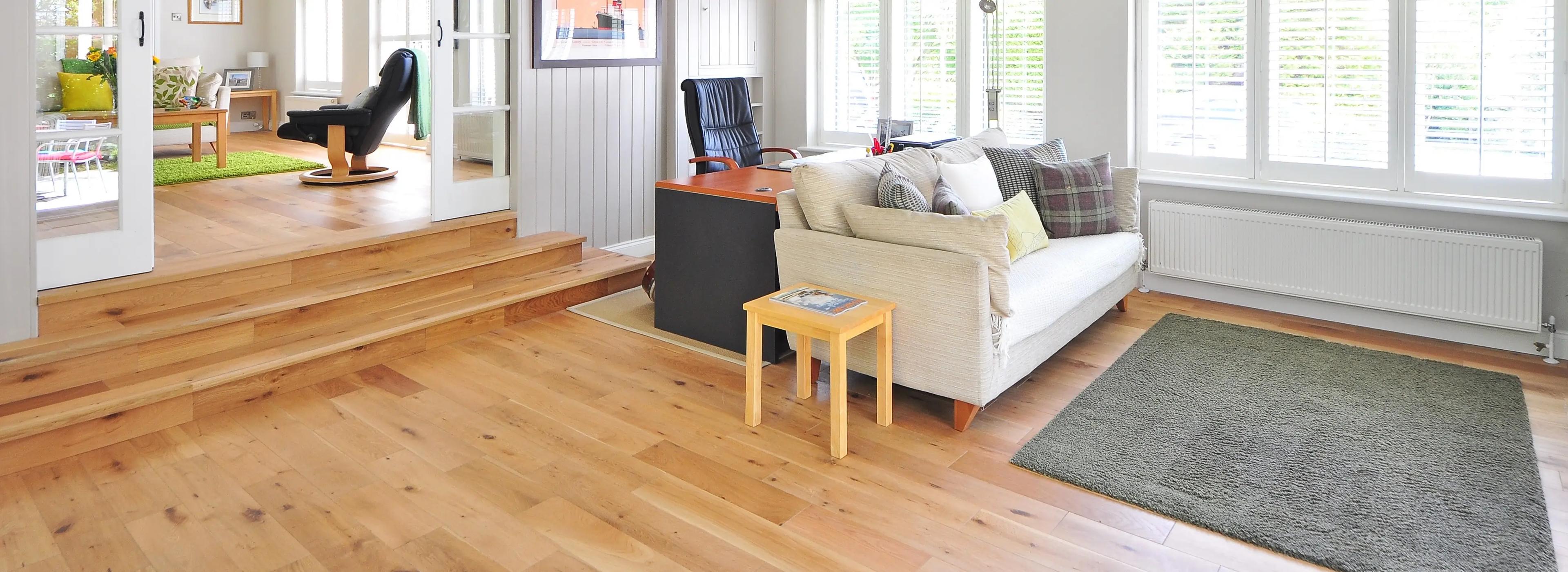We may be compensated if you purchase through links on our website. Our Reviews Team is committed to delivering honest, objective, and independent reviews on home products and services.

5 Best Flooring Companies in Atlanta, GA
The best flooring company in Atlanta is Floor Coverings International of Alpharetta.
Get matched with a top local pro
Join the 6,755 people who have received a free, no-obligation quote in the last 30 days
- Fact Checked
Fact checked by one of our trusted team members.
- Updated 2024-04-18 00:00:00
Atlanta experiences 88°F summers on average, so floors that don't retain the scorching heat are essential. A professional flooring service can help keep your space comfortable, but which one is the best for your needs? Begin your flooring company search with these Atlanta, GA providers.
5 Best Flooring Companies in Atlanta
Brands are algorithmically curated from a database of local service providers near you. We require a minimum number of Google reviews and average ratings for provider inclusion.

Floor Coverings International of Alpharetta
Ratings are based on our detailed proprietary methodology and review standards.
Based on 94 reviews

LL Flooring
Ratings are based on our detailed proprietary methodology and review standards.
Based on 64 reviews
593 Holcomb Bridge Rd Suite 593, Roswell, GA 30076
(404) 692-4483
www.llflooring.com/stores/ga/roswell/...Peach State Hardwood Floors
Ratings are based on our detailed proprietary methodology and review standards.
Based on 167 reviews

JVP Flooring LLC
Ratings are based on our detailed proprietary methodology and review standards.
Based on 80 reviews

Top Tier Floor Care
Ratings are based on our detailed proprietary methodology and review standards.
Based on 20 reviews
Facts about Atlanta
- Average Max Temperature:70°F
- Average Min Temperature:53°F
- Average Daily Precipitation:0.14”
- Median Home Size:1,900 sqft
- Homeownership Rate:53.5%
- Most Popular Flooring Type:Tile
Popular Types of Flooring
There's a flooring material for every design preference and price point. In this section, we'll break down the most common types.
Hardwood Flooring
The appeal of hardwood floors stands the test of time. With shades including walnut, oak, cherry, maple, and more, it can fit any design without sacrificing durability. However, it's among the priciest of flooring materials and requires consistent maintenance. At a minimum, you'll need to use specialty cleaning products regularly and restore its finish every few years. Since it's susceptible to water damage, it's also not suitable for basements, laundry rooms, or bathrooms.
Engineered Wood Flooring
Engineered wood gives you the aesthetic of hardwood without the demand for regular maintenance. They use a plywood substrate with a layer of real hardwood on top – ultimately saving you money. While it's more resistant to warping versus true hardwood, it can sound hollow to walk on and can't be refinished more than once.
Laminate Flooring
Laminate floors come in tile and wood finishes, but they all have a particle board base. A strong plastic coating gives them defense against scratches and simplifies cleaning. However, it chips easily and is susceptible to moisture damage.
Vinyl Flooring
Vinyl flooring has excellent water and fading resistance and requires minimal upkeep. Popular options include luxury vinyl tile (LVT) and luxury vinyl plank (LVP), with both having equal strength and longevity depending on the model you buy. Vinyl flooring installation cost sits comfortably between wood and laminate.
Tile Flooring
Tile flooring is suitable for bathrooms, kitchens, and other moisture-prone areas. It provides years of life with minimal maintenance needs, and is available in many materials, colors, and patterns. However, it might not work well for bedrooms and living rooms since it's colder and less grippy to walk on. Pricing fluctuates between styles, with ceramic less expensive than porcelain.
Stone Flooring
Stone floors are among the most waterproof available. You can choose from a variety of bold design options, including marble, travertine, granite, and sandstone. However, like hardwood, it can be expensive and difficult to clean.
Linoleum Flooring
With proper maintenance, linoleum floors can last for years. It is an affordable choice with numerous methods for adaptation. However, it can easily get dented or scratched and has been known to lose its original coloring when exposed to direct sunlight. The sun's rays also lead linoleum to fade over time, and it may not be suitable for moisture-prone spaces.
Carpet
Carpet is the most affordable flooring option. It can make a space feel more cozy and is great for muffling sound. You don’t have to fret about scratches or dents, and the cushioning makes it a safer choice for babies and toddlers. However, the fibrous material easily holds onto stains, moisture, and odors, which isn't ideal for pet owners or allergy sufferers.
How to Choose a Atlanta Flooring Company
Choosing a floor installer is just as critical as choosing a design. To ensure you get the most value, consider each of the following criteria.
Reputation and Reviews
The first thing to note is whether a company is known for good service and high-quality work. You can learn more about previous clients' experiences from review sites like Yelp, Google, Trustpilot, and the Better Business Bureau (BBB). Even the most reliable flooring installers will have both positive and negative reviews. Look for how a provider responds to complaints and interacts with others. If it works toward a satisfactory resolution and acts in good faith, that's an encouraging sign. However, if it's dismissive or has a high negative-to-positive review ratio, it's wise to avoid working with it.
Portfolio and References
Most floor installers keep portfolios of their previous work. We recommend requesting a copy so you can examine the crew's craftsmanship. It's also customary to ask for references from past customers. Once you have their contact information, get in touch and ask about their experiences.
Specialization and Services
Look for a provider that specializes in the type of flooring you're interested in. For example, a crew might be experienced with carpet but not hardwood. A company's service offerings can also make a difference. At the very least, you should choose a provider that will haul away your old flooring materials. However, installers can also offer hardwood refinishing or design advisory.
Cost
Cost is key to consider, but it should be less important than quality in your decision-making process. We recommend getting multiple different quotes for your flooring job to compare pricing and workmanship. Many companies offer on-site and online estimates to simplify the process.
Warranties and Guarantees
You should look for two different warranties in your company search. A manufacturer's warranty protects you in case of a product defect, while an installer's warranty covers workmanship. While a few manufacturers and contractors have lifetime warranties, most are still restricted to a specific time period (often ten years.) If you'd like additional coverage, you might be able to pay extra for an extended warranty.
Estimated Timeline
Time management is essential for a successful flooring job. Before you agree to work with a company, request an estimated timeline and inquire about what hurdles could impact the project. If a company commits to finishing the job by a certain deadline, get that guarantee in writing and state your expectations clearly as the work progresses.
Frequently Asked Questions about Flooring in Atlanta
Generally, flooring replacement costs in Atlanta fall within $0.60 to $4.00 per square foot. An estimate will factor in your space's size, the kind of floor you'd like, and the job's complexity. You can discover the best price by requesting multiple estimates and comparing them side by side.
Most homes in Atlanta have a mix of different flooring types, but the most popular in the area is tile.
Flooring installers in the Peach State must be licensed residential contractors. The Georgia Secretary of State issues licenses to registered business owners after they meet experience requirements, pass exams, and complete background checks. Each licensee must have a minimum $25,000 personal net worth and at least $300,000 of liability coverage.
To choose the right flooring material for your space, think about your budget and lifestyle. Some homeowners prefer to reduce maintenance, while others don't mind the upkeep of a more traditional design.
Just as well, consider the nature of the space itself. Is it exposed to high foot traffic or moisture? What look would pair well with the walls, furniture, and trim?
A Atlanta flooring installer can discuss all these considerations and more to help you make an informed decision.
A basic vinyl floor installation could take just a few days. Something more complicated, like tile, could require up to a week of work. Your company will give you an estimated timeline based on the experience of the crew, your room's size, and the specific flooring type you've purchased.
